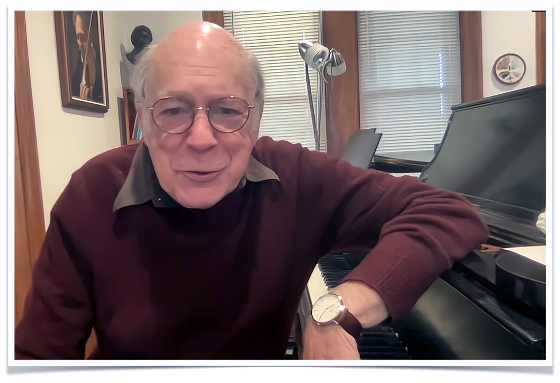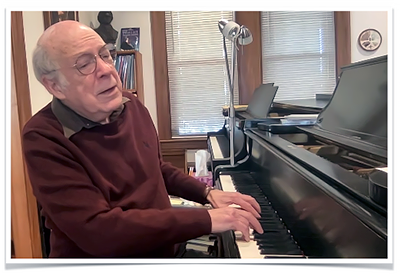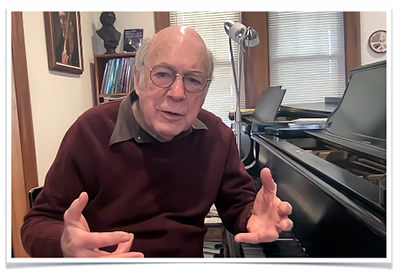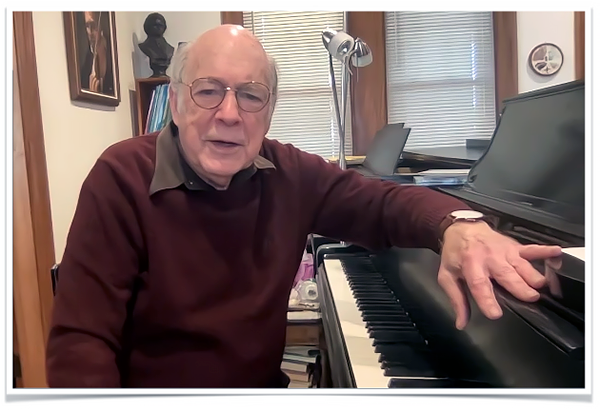Music Educators Association of New Jersey
Serving teachers and students since 1927



Following President Danette Whelan’s opening remarks, Program Chair Sophia Agranovich introduced Victor Rosenbaum, internationally acclaimed concert pianist and master teacher who has appeared in prestigious concert halls and music festivals. Formerly, he was the piano department chair at the New England Conservatory of Music. His programs for the MEA have always been inspiring and enlightening. For more about Victor Rosenbaum, see the many articles and videos including http://www.metfestival.org/faculty-victor-rosenbaum.html on the Internet. This meeting was conducted on Zoom. Danette was the Zoom host/facilitator.
Victor reminded us of the piano teacher’s lament: “why won’t my students practice more?” Perhaps to them, piano practice is drudgery, unlike athletic practice, where students meet with a coach and teammates, sometimes daily, without complaint. The perils or dangers of some practices can render practice counterproductive. The first danger, of pushing practice, is physical injury like tendinitis, carpal tunnel syndrome, or overuse. Rare in elementary students, this danger arises among advanced piano students who may compare their length of vigorous practice sessions. The second danger, of mindless repetition, is cessation of listening and stifling of the imagination. Victor then quoted comments from luminaries in the arts and sports conveying their thoughts on the goals and the role of practice. The basketball coach John Wooden said, “Practicing with purpose is the key to progress.” Martha Graham remarked, “Great dancers are great because of passion, not technique.” Victor commented that we “learn by doing to build skills.” But effective practice must be purposeful practice with disciplined goals.
 The first remedy of practice peril is to substitute the word play for practice. “Tell the student, ‘Play piano 30 minutes a day.’ Then figure out how you can make practice feel like play!” Children have fun with art; they enjoy drawing and modeling with clay. They can be imaginative and creative. At the piano, they may enjoy using their imagination to improvise and compose. Teachers can guide them.
The first remedy of practice peril is to substitute the word play for practice. “Tell the student, ‘Play piano 30 minutes a day.’ Then figure out how you can make practice feel like play!” Children have fun with art; they enjoy drawing and modeling with clay. They can be imaginative and creative. At the piano, they may enjoy using their imagination to improvise and compose. Teachers can guide them.
How to play at the piano: think “music,” not piano playing. The student engages in a variety of activities in addition to studying a score. Help the student to improvise by providing a framework on which to build musical ideas. Ask the student to: compose a descriptive piece; convey a feeling in an original piece using a rhythmic motive; compose a piece based on a melodic motif of five to seven notes; draw a picture about your music. When playing a scale, the student can change the rhythm.
Piano play will be more interesting with creative experiences and discovery activities. For example: exploring the entire keyboard beginning with some arpeggios, (left hand, then right hand); learning rote pieces including making music on black keys; or improvising musical imagery inspired by a story. Victor asked “We may focus on ‘independence of fingers’ but why not consider ‘interdependence of fingers’ as we play a series of notes, dyads or chords?“ Explore scales by playing tetrachords with alternating hands, using all fingers except the thumbs. “Think ‘stepping up, stepping down’. What about dependence in phrasing, harmony, or structure?” Victor demonstrated as he made these suggestions.
Discovery activities might include: trying to make a beautiful sound and using the pedal. “For me,” Victor said, “music emanates from the imagination of the composer. Imagine it before you play. Encourage your students to play expressively, using imagination to render a personal interpretation.” He then likened the mechanical pianist to the actor who reads his script without understanding. “The goal in drama or music is to express character.” He added that singing melodies and adding words to them often help students connect with their pieces. The elementary student can explore the piano and improvise to find sounds that express feelings. Later, that student can learn how to notate those sounds.
 Victor Rosenbaum maintained that establishing improvising and composing as important features of the piano lesson leads to a greater appreciation of music. In closing, Victor praised teachers of beginning students for their patience and ingenuity.
Victor Rosenbaum maintained that establishing improvising and composing as important features of the piano lesson leads to a greater appreciation of music. In closing, Victor praised teachers of beginning students for their patience and ingenuity.
A Q. & A. session followed. Continuing on the theme of making practice into “play,” Victor asserted that kids love taking things apart and reassembling them. They can study structure but they also like to make and create. He also reminded us of the solitary activity that piano study can be and suggested offering group lessons of three or four students at a time. Another possibility would be scheduling back-to- back lessons of same-level students so that duets may be played. To add company at practice sessions, older students can serve as practice coaches for younger ones. This is a win-win because the elementary student is encouraged and inspired by the advanced one, and the practice coach learns something about teaching.
Several of the MEA members praised Mr. Rosenbaum for sharing his perspectives, experience, and teaching techniques. One teacher said that her enthusiasm for teaching beginners was renewed and she would now open her waiting list to them. The emphasis on imagination, improvisation, composing, purposeful playing, and teaching techniques gave us many ideas for putting play into teaching practice. This strengthened our hopes that our students would be playing piano for longer periods and making greater progress, thanks to Victor Rosenbaum.

Bertha Mandel, writer
Lisa Gonzalez, Screen Shots & Layout